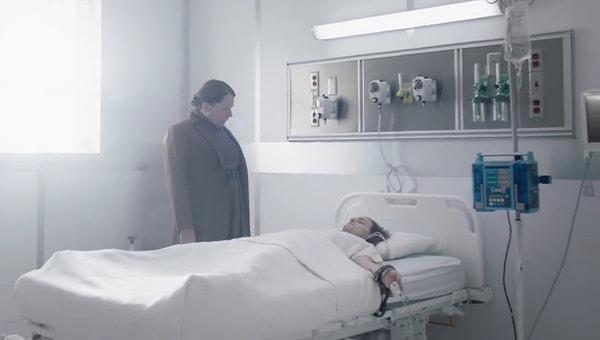The Ugly Truth About Aunt Lydia in 'The Handmaid's Tale'
Warning: This article contains spoilers up to season 5 episode 3
Many members of the 'The Handmaid's Tale' fandom can point to a specific scene that makes them cry every time they watch it. It's different for everyone. It could be Rita walking off the plane, or maybe it's Moira searching through a cloud of smoke in Chicago. Whatever it is, it's proof that the show is a masterpiece.
For me it was the beginning of season 2. The handmaids were ripped from their homes, chased down by dogs, and lined up on a gallows with nooses wrapped around their necks.
The horror and desperation became an unstoppable force, crashing down on millions of viewers. We didn't have a choice. We sobbed our eyes out as we watched the girls reaching to hold hands with one another. They were shaking so hard they could barely breathe. June looked up and we saw what looked like the light at the end of the tunnel. She was going to die.
A guardian called out, 'By his hand!' A lever was pulled, and the world gasped. The girls did drop, but not far enough to be hung.
Instead, Aunt Lydia's voice rang out from a loudspeaker. 'You will love the Lord thy God with all your heart.'
Had they not been tied up, they probably would've salvaged her for that. It was impossible to imagine how anyone could be so ruthless. They didn't do anything wrong. They just refused to stone Janine. Aunt Lydia didn't stop there, either. She used a torture technique, forcing them to undergo propaganda sessions while holding a stone up in the middle of the rain. She handcuffed Alma's hand to a lit stove. She even cut out one of the handmaid's tongues.
This all started because Janine was losing touch. She was convinced that Commander Putnam loved her and that he would come for her after she was transferred to another posting. He had been lying to her and abusing her, and she bought into it.
When Janine realized what had happened, she kidnapped Angela, and threatened to jump off a bridge with the child in her arms. June was able to talk her into handing the child over. But she still jumped off, injuring herself in the fall.
Strangely enough, this was one of the first times we saw Lydia show any sign of compassion. It wasn't much, just a remark when she visited Janine's bedside. But the woman was so cruel that it was like seeing Ann Down step out of character.

Courtesy of Hulu
There were a few more glimpses of Aunt Lydia's compassionate side in season one. She insisted that the injured handmaids should be allowed to attend the Mexican trade delegation dinner. But Serena didn't want to show off the regime's crimes.
To Lydia, corrections weren't crimes, and there was no reason to hide them. They were her way of teaching the girls that there would be consequences for their actions under this new regime. Those that lost a hand or an eye were left with a permanent reminder to be obedient. That was her way of keeping them safe from the chopping block.
This twisted mindset seemed to be her main motivation throughout the series. She was deluded. She was adept in all of the regime's control tactics, from disfigurement to torture. It was her job to spread propaganda and indoctrinate the girls. Much of what Gilead taught was false and misleading. They made up grotesque lies about the time before. In the novel, some of it was so ridiculous that Offred couldn't understand how anyone could believe a word of it. But Lydia did.
We saw that in her flashbacks from the time before. She made chili for a church potluck. She would pray before meals. She'd try to get others to go to church with her, and she looked down on anyone who didn't share her beliefs. It was clear that she became part of the religious movement that led to the rise of Gilead.
Presumably her delusions grew worse as time went on. Church get togethers led to war, purges, and a holocaust, allowing her to justify crimes against humanity. She had a moral compass pointed south instead of north. But it was a moral compass. She thought she was working for a just and righteous cause, doing the Lord's work. They were replenishing the human race. That's why she cried when she rang the bell announcing that June was pregnant in season 2.
This woman didn't just drink the Kool-aid. She was blackout drunk on it, convincing herself that her anger was righteous indignation. Her vengeance was God's sword. Her sadism was exactly what the world needed. All of her crimes could be chalked up to doing the right thing. She was exercising her beliefs, doing what God wanted. And when you're told that you're doing God's work, you can justify anything. She is the embodiment of that principle.

Courtesy of Hulu
Lydia Finally Started to Show Signs of Breaking
In season 3, there was a particularly touching moment when Lydia and June were in DC. Serena had just kicked off the campaign to get Nichole back, and Fred was planning a giant prayer fest at the capitol building--a gathering of slaves in front of the Lincoln Memorial.
June was traumatized at the sight of silenced DC handmaids, who had metal rings pierced through their lips to keep them from speaking. She wanted to know if Lydia supported the measure.
Lydia didn't like it. She said that the trip to DC had been tiring, and when she got tired, she thought about all of the good she could do in the world. She thought of June. This was the first time that Lydia had spoken out against one of the regime's tactics.
On a visit to the Putnam's, Janine horrified the commanders and their wives when she burst into the sitting room, asking if she could be their handmaid again. Lydia started beating her, almost to the point of injuring her. June rushed in bravely, stopping Lydia.
Normally Lydia wouldn't have cared. She thinks beatings are the Lord's work, but she was starting to question things. She walked out of the room humiliated and babbling about how sorry she was. She had lost all of her dignity, and it was impossible for her to deny that she had done something wrong.

Courtesy of Hulu
Janine Was Her Weak Spot
It's hard to say when Lydia's love for Janine really caught on. There were signs from the beginning, but there were no significant milestones--not until Janine visited Angela in the hospital.
Angela was sick, and she wasn't doing well. They tried to keep it from Janine, but she found out anyway. So they had to do something to soften the blow.
When the doctors concluded that Angela couldn't be treated, Janine begged to hold the child. The Putnam's agreed, thinking it couldn't hurt. They thought the child was going to die anyway.
The hospital room was cold, dark, and sterile. It was really depressing. Janine took off her mask and sat down to hold her daughter, hoping for a more personable experience. The next morning they found her sitting in the windowsill singing and playing with Angela, who had made a full recovery.
Lydia was shocked, almost to the point of tears. How could she deny the magic of that moment? It was a miracle.
We have to remember, Lydia was a teacher. She worked with children. She loved them, and she believed in protecting them. She also witnessed what she called 'the plague of infertility,' which was the regime's main talking point during the early days.
They justified a holocaust, a coup, and a war by pointing to the birthrate. They said that everything they did they did to replenish the human race. Lydia believed that with all of her heart. It was something she felt very strongly about. So when she found Janine with Angela, it must've been a spiritual revelation.
Aunt Lydia Can No Longer Deny the Crimes of the Regime
After Angel's Flight, Aunt Lydia was confined for 19 days. She went in front of the council and gave them a fiery speech, telling them that they needed to bring June to her.
Under normal conditions, she probably would've turned June into a quadruple amputee. Instead she walked into June's cell, and her righteous indignation seemed to melt away. She tried to play her old tricks. She told June that it was her fault. She used every bit of twisted logic in the book, and nothing worked.
June got to her. She said that Lydia's girls--who were her responsibility--were told that if they played nice and followed the rules, they would be safe. Instead, they were sent out to be abused and beaten, and that was Lydia's fault--her fault, not June's.
Lydia couldn't take that, because she knew it was true. The leaders that she placed her faith in were nothing but a pack of dirty hypocrites, bringing handmaids into their studies and spending their nights at Jezebels. She couldn't ignore their crimes--worse, she had played a part in them.
This was one of the most poignant examples of Lydia's doubt in the series. Many have pointed it out before. It was a turning point for her. She cannot abide hypocrisy. She won't follow a dirty preacher. It would mean that the atrocities she committed were actual atrocities, not God's work. She can't stomach that.

Courtesy of Hulu
Things Are Changing
Aunt Lydia's moment of doubt was just one example of the changes she went through in season four. After the handmaids ran off, the other aunts blamed her. So they tried to stick her with the elderly women, have her play cards and do puzzles. They wanted to put her on a shelf somewhere, so they could replace her and rise through the ranks. But Lydia wouldn't have it.
There was a new group of handmaids coming in, and she wanted to train them. It is revealed that she had been collecting secrets about all of the commanders--testaments to their crimes. She uses these secrets as a means of exerting influence in Gilead.
She went to Commander Lawrence to blackmail him, saying she had proof that he helped June with Angel's Flight. She threatened to report him if he refused to restore her old position at the Red Center.
They struck a deal. He told her that he would put her back into power if she blackmailed Commander Calhoun into giving him his old seat back on the council. She agreed and they decided to work together to reform Gilead.
Lydia's approach to the girls seemed to change. She told them that wicked men would try to hurt them and lead them astray, but they would never walk alone. She would be there for them when that happened. It's a slight change--presumably to protect them and collect more secrets.
These were all intriguing developments, and they were very important. But we were still seeing evidence of false beliefs. She still hurt people. She was still abusive to the girls. She was still the old Aunt Lydia who added a bit of oomph into her corrections. That came up right away when Lydia saw a group of aunts laughing at her. The handmaids in training were scrubbing floors, and the aunts were in the corner gossiping.
Aunt Lydia lost it. She screamed at one of the handmaids and turned on one of her fellow aunts, poking her with a cattle prod. It was a reminder for the audience. Her crimes against humanity are justified by false beliefs, but they also stem from anger.
Janine Will Help Shape Lydia's Future
After she stuck her fellow aunt with a cattle prod, Lydia was brought back to Commander Lawrence's office. He informed her that Janine was picked up in Chicago.
She's brought to tears by this. The plan was to send Janine to a magdalene colony, where she would work the fields and commanders would force themselves on her once a month. It would've been a bleak fate, one that Lydia could not subject Janine to.
She wanted to put Janine back into service instead, but Janine begged her. She said she'd rather die. So Aunt Lydia did something extraordinary. She brought Janine back to the Red Center and put her to work, leaving her in limbo. There was no posting, no assignment, nothing. It mad zero sense. The other aunts seemed to think she was crazy. Lydia didn't know what she's doing. She told herself she'd find Janine a posting, but she wasn't going to. She couldn't. She knew what would happen, and she was not about to subject Janine to that.
There was a massive conflct going on inside Lydia's head, and she was mostly blind to it at that point. There was doubt, something she's not comfortable with. There was anger--anger at the regime, anger at herself. There was also compassion, which she could no longer deny, not with Janine at least. It was a strange time for a person who was so firm in her convictions.
She also has a huge capacity for self-delusion, which she makes full use of. She was telling herself that she was still on the Gilead straight and narrow, but she was making these wildly unconventional decisions, playing favorites, and telling her girls to report back on their commanders. This conflict could not sustain itself for long. She was on the precipice of something.
The Path of Doubt
Lydia seemed to find a place for Janine when Janine managed to get Esther--a former child bride--to end her hunger strike. Esther is a vicious, bloodthirsy girl and the product of unspeakable abuse at the hands of older men. She could not accept her fate as a handmaid.
She attempted suicide and poisoned Janine in the process, resulting in what many would consider the best scene in Ann Dowd's career.
Lydia has brought up a lot of emotions over the course of the show. She's repulsed us and infuriated us. She's brought us to tears. There were times when we've wanted to jump through the screen and stab her just like Emily. But we never saw anything like this. It was like discovering what the actress is capable of all over again.
She showed up at the hospital where Esther and Janine were being held, her face pinched and red from crying. When she entered Esther's room, she was so livid it was a wonder she didn't unplug the life support machine. Instead she hauled off and bashed the girl, who was still unconscious. After that, she walked into Janine's room and fell to her knees at her bedside. She was bawling, trembling, and stammering.
She begged God not to punish Janine to teach her a lesson. She said that she knew that God had been unhappy with her. She said she's made choices and that she was only trying to keep her girls safe. He must understand that. She said she'll change, that she'll do things differently. It was hard not to believe her.
It's one of the most moving scenes in the entire series. Ann Dowd deserves an Emmy for it. If this is what she can do, then the fandom will be bowled over when the spin-off takes hold.
A Changed Woman
Aunt Lydia fell asleep by Janine's bed. When she woke up, Janine had made improvements in her condition. Lydia found her sitting in a wheelchair outside with a nurse.
Lydia will no doubt see it as a sign that God has answered her prayers and that the promise she made must be upheld. She does change, and she will do great things.
But she also has an enormous capacity for self-delusion. She didn't renounce Gilead or her faith. She never said that she'd stop the corrections or find a way to rescue all of the handmaids. She's going to do things differently--presumably the same things that she did before.
Someone who can delude themselves into committing those kinds of atrocities will put up psychological barriers to justify bad behavior and reinforce false beliefs.
For a person to change, they have to look inside themselves and realize their mistakes. Lydia can barely see past her nose. She will probably delude herself again. It's what she does. It's a lifelong coping mechanism that won't just go away after one prayer session.
When people see the light, they start down a certain path. They try to be good, but far too often they act like making a change in their life is as simple as changing their clothes. It's not. She's going to have to train herself to move past her anger issues, erase beliefs she's held on to her entire life, and end behavioral patterns that have gone on for decades.
Old humans can learn new tricks. But all of those things are ingrained in her at that point. They're chiseled into stone. Her anger is a huge part of that. Moving past anger issues is difficult for anyone. You don't just squeeze a ball or count to ten. You push past instinct and need and an overwhelming rush of biochemicals.
How does a person that deluded--even after that scene--put forth that kind of effort? Even if she tried, she couldn't do it alone. She also loathes herself. She pulverized a mirror because she tried to have sex with a man. She hates the 'sins of the flesh' that drive human nature. Those types of feelings etch themselves into a person's being.
That's not the kind of complex people move past easily. But it is the kind of complex that pushes you to hurt others and lash out at them--especially the kind of girls she works with.
She sees them as a 'certain type of woman' that embodies all of the things she hates in herself--especially that sexual instinct. It's what handmaids will always represent in Gilead society. That will still come out. That sadism isn't going anywhere.
She can collect her secrets about the leaders. She can start helping the other handmaids. She can even decide to work with Mayday down the line, but she will always have problems.
Keşfet ile ziyaret ettiğin tüm kategorileri tek akışta gör!

Send Comment